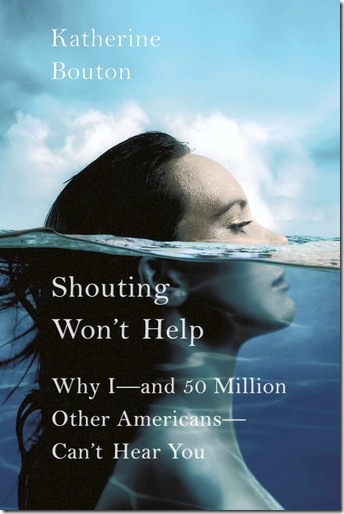Nearly 50 million Americans suffer from hearing loss, most of it related to aging and exposure to loud noise.
For more than two decades Katherine Bouton has lived with hearing loss so severe that it forced her to quit her job as a New York Times editor.
Although Shouting Won’t Help is sometimes overly technical and is stuffed with statistics, the book nevertheless provides an important and much-needed overview of this “hidden disability, one often borne in secret.”
As the author’s hearing loss progressed, she was “depressed, angry, stalled in my work, isolated from my family and friends.”
Bouton obtained hearing aids, even while she lived in denial about the extent of her disability. She suffered a nearly total loss of hearing in one ear after a trip to Turkey, and speculates that a parasite or virus triggered a genetic flaw related to hearing.
Noise is the culprit for most hearing loss. Normal conversation measures about 60 decibels. The human pain threshold for noise is about 130 decibels. Noisy sporting events and rock concerts sometimes approach or exceed that tolerance level, causing permanent damage.
Children’s developing ears are especially vulnerable, Bouton says, noting that the noise from some toys exceeds 100 decibels. The Consumer Product Safety Commission does not regulate noise from toys.
It is no surprise that hearing loss is associated with aging, but Bouton’s figures are sometimes more confusing than enlightening. She first tells us that two-thirds of Americans 70 and over are hearing-impaired, but later says that 47 percent of those who are 75 and older have a hearing impairment. Which figure is correct?
Bouton is most effective when she describes her own travails, particularly during her years as an editor at The New York Times, first on the Times Magazine and later as daily book and theater editor. She recounts meetings at which she could barely hear anything that was said and would encourage colleagues to send her their thoughts in an email.
Out of vanity, she tried to keep her hearing loss a secret, even as she was crashing. “I drank too much,” she writes, “I stopped seeing friends, I stopped going to movies and parties, and eventually, bitterly, left my job.”
For years the author concealed her hearing deficit. Some people she encountered thought she was just “arrogant or remote, absentminded or distracted, drunk or just plain stupid.”
Bouton resisted getting a cochlear implant for her deaf ear. She notes that it can takes up to two years for hearing-impaired people to adjust to an implant, a device that is surgically implanted under the skin behind the ear.
 Most hearing-impaired adults do not get hearing aids, in part because of the expense, which can run as high as $6,000. Insurance does not cover hearing aids. Cochlear implants are far more expensive, but they are covered by insurance.
Most hearing-impaired adults do not get hearing aids, in part because of the expense, which can run as high as $6,000. Insurance does not cover hearing aids. Cochlear implants are far more expensive, but they are covered by insurance.
Scientists are working to discover a biological cure for hearing loss, but such a breakthrough is probably at least a decade away.
Despite her use of a hearing aid in one ear and an implant for the other ear, the author still cannot hear well enough “to follow a conversation except under optimum circumstances ― one on one, facing each other, in a quiet place.”
Yet she is grateful for what she can hear. “I can hear birds … a rushing stream … a car coming up behind me on a country road … the funny half growl, half whimper my dog makes when he wants to go out … snippets of overheard conversations.”
The book’s message is clear: Significant hearing loss is common, especially among the elderly. Hearing aids and implants can help, but they will not restore full hearing. Mechanical devices simply cannot duplicate the marvel of the human ear.
Shouting Won’t Help: Why I — and 50 Million Other Americans — Can’t Hear You, by Katherine Bouton; Farrar, Straus and Giroux, 276 pp., $26
Bill Williams is a freelance writer in West Hartford, Conn., and a former editorial writer for The Hartford Courant. He is a member of the National Book Critics Circle and can be reached at billwaw@comcast.net.
